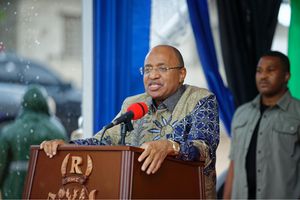Museveni defiant as US firms stop Uganda imports over anti-gay law

Ugandan President Yoweri Museveni. PHOTO | COURTESY
What you need to know:
- The US embassy in Uganda says Washington had made it clear that the enactment of the anti-gay law would affect Uganda’s economic prospects.
Several companies in the United States under the Africa Growth Opportunity Act (Agoa) have stopped buying textiles from Uganda, citing the enactment of the Anti-Homosexuality Act (AHA), 2023.
This was revealed by Ugandan President Yoweri Museveni during during an event in Kampala on Sunday.
“The homosexuals in the US are interfering with our export of textiles. Some of the orders have been cancelled by the homosexuals there,” the President said.
He added: “But I am not concerned about that because the money you have been squandering with the second-hand clothes, importing other people’s fabrics, is much more than what we are going to earn from the sales to the US.”
Agoa is an initiative of the US government which began in 2000 where eligible countries, including Uganda, export textiles and agricultural products to America tariff and quota-free.
In return, the beneficiary countries open their markets to second-hand clothes mainly from the US.
The value of Uganda’s annual exports under the trade incentive had grossed $200m (Shs741b).
Government officials in Kampala were not readily available to comment on the matter yesterday.
Ms Ellen Masi, the public affairs counsellor at the US Mission in Kampala, said Washington had made it clear that the enactment of the anti-gay law would affect Uganda’s economic prospects.
“On March 28, more than 35 major multinational companies, including those with operations and employees in Uganda, released a statement highlighting the negative repercussions the AHA will have on their ability to do business in Uganda,” she said.
According to her, nine out of every 10 of the Fortune 500 companies maintain non-discrimination policies on the basis of sexual orientation.
“So, the enactment of the AHA could deter foreign companies from doing business here in Uganda,” Ms Masi added.
Following reports that the recruitment of Ugandans, especially students by gay groups was rising, Parliament, egged on by religious leaders and constituents, in early May enacted Anti-Homosexuality Act, 2023 which President Museveni signed into law three weeks later.
The enactment drew protests and condemnation from Western capitals, including Washington, with many governments threatening actions.
President Joe Biden subsequently ordered a review of US relations with Uganda, with Secretary of State Antony Blinken stating that the eligibility of the country for Agoa was being reconsidered.
Other than visa restriction on the Speaker of Parliament, Ms Anita Among, a champion of the anti-gay law being challenged at the Constitutional Court, the Biden administration has not yet imposed additional sanctions.
However, in August, President Museveni also banned the importation of second-hand clothes, saying they were of “dead people”.
“I have declared war on second-hand clothes to promote African wear. We are going to stop importation of second-hand clothes to create jobs from textile factories,” he said in an address in Mbale, adding, “Anybody who will stand in my way, I will crush him. We will not allow second-hand clothes to enter into the country anymore.”
Background
The British colonial masters were the first to codify the offence of homosexuality as unnatural sex and Uganda enacted a specific law to deal with it in 2013, although the Constitutional Court annulled the legislation the next year on grounds that it was enacted without quorum.




